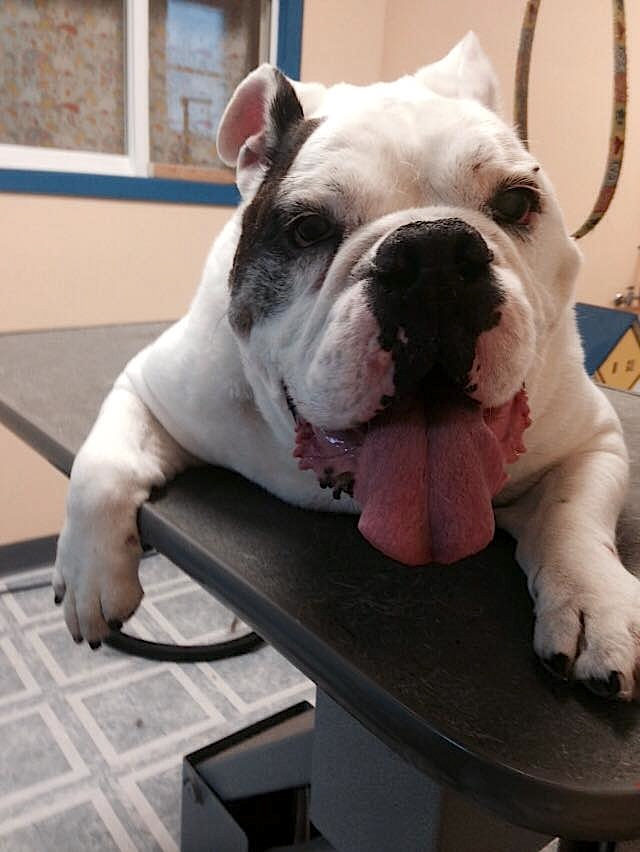- This post contains affiliate links. Read more here.
- Not a substitute for professional veterinary help.
A wheezy dog may sound humorous, but wheezing can actually be a symptom of serious respiratory distress and conditions that include heartworm, allergies, tumors, collapsing trachea, viral or bacterial infections such as kennel cough or pneumonia, and even canine asthma. Additionally, the West Coast has recently experienced wildfires and smoky skies lasting for days. In these areas, the air quality index sometimes reported outdoor air quality as “very unhealthy” for those with respiratory conditions and the elderly and young children. This poor air quality can trigger respiratory issues in our pets as well.
While some of the brachycephalic breeds (the term for the shortened muzzle and “smushed” face in breeds like the pug, Pekingese, bulldog, and others) can get wheezy more easily than others, due to their shortened nasal passages, wheezing is a symptom that should be addressed by a veterinarian in any dog as quickly as possible.
Wheezing is a symptom of breathing problems
Wheezing in dogs, as in humans, is generally a symptom of respiratory distress. It occurs when the bronchial passages become inflamed and the resulting swelling causes the airways to constrict. Wheezing often comes paired with increased mucus and a whistling sound in the lungs. Symptoms such as coughing, panting, gagging, and even a pale or bluish tinge to the tongue and gums are also common. If you also see appetite loss and/or lethargy, get your dog to the vet immediately.
While canine asthma, also known as allergic bronchitis or chronic bronchitis, is seen less commonly than feline, or even equine, asthma, the disease can be exacerbated by the poor air quality (like those caused by wildfires), or caused by allergic reactions to something else in the environment, such as household cleaning products, perfumes, hair spray, spray deodorants, flea control products, insect bites or stings, dust, pollens and changes in weather conditions, and even food allergies.
What can be done?
First, a veterinarian needs to determine if your dog’s wheezing is from another condition. Sometimes kennel cough infections or “reverse sneezing” can produce symptoms that seem similar to asthma. A physical exam with a detailed history, and usually including x-rays, will enable your vet to determine if your dog is experiencing asthma. Treatment for asthma usually starts with antihistamines and progress to things like bronchodilators and steroids, depending on the severity and if the condition is chronic in nature or is progressing.
One of the main goals in treating canine asthma is to try to identify and remove any potential allergens that might be triggering asthma attacks. This requires diligence by the dog’s owner. Owners will need to keep diaries of each asthma attack, noting severity and length, as well as behavior and possible exposures prior to the attack, time of day, and correlations to meal times and other daily, routine habits. Sometimes this can narrow down a probable allergen, and, once eliminated, future attacks can be minimized or eliminated altogether.
If asthma attacks continue to occur regularly, your veterinarian will prescribe a metered dose inhaler designed to fit a dog’s muzzle to assist with administering the bronchodilator and anti-inflammatory medication. This will ensure the medications are being inhaled and directly treating the inflamed bronchial passages. Dogs with chronic attacks should be treated aggressively to prevent bronchial damage associated with continuing airway inflammation.
What wheezing means long-term
The sooner you catch canine asthma and get a diagnosis and treatment started, the more the outcome and long-term prognosis generally improves. Don’t be afraid to get a second opinion or even go to a veterinary specialist if you need to be sure you’re getting the right treatment for your dog. The goal is to catch it early and can prevent permanent damage to the airways. Even with chronic asthma, clinical signs can typically be controlled with treatment. Long-term care will be necessary in most cases, but with attentive care by owners and good medical management, a normal lifespan with good quality of life is probable.







